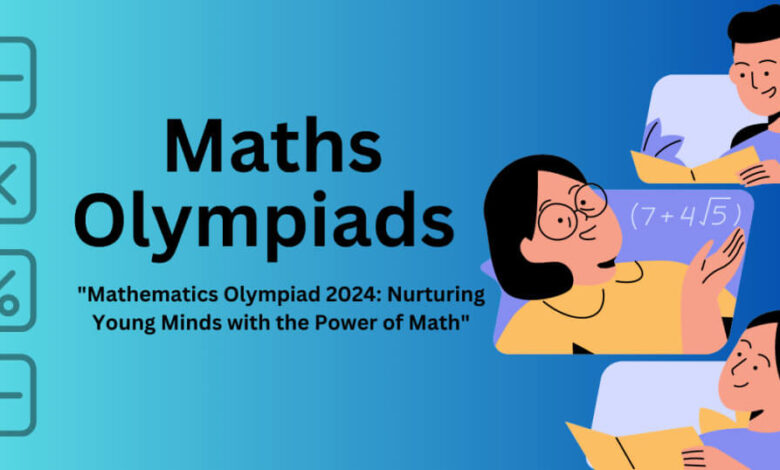Olympiad Maths for Class 5 – Syllabus, Preparation Tips & Exam Strategy

For Class 5 students, Olympiad exams are not just assessments — they are an opportunity to develop logical thinking, problem-solving, and analytical skills that are not typically included in regular school textbooks. Among all subjects, Olympiad Maths for Class 5 stands out as it uniquely challenges students to apply their mathematical knowledge in practical, real-world contexts, sparking their curiosity and motivation.
This guide will not only outline everything you need to know about the syllabus and your preparation plan, but also provide practical advice for the exam. This advice is designed to empower young learners, helping them approach the Olympiad with confidence and a clear strategy for success.
Understanding Class 5 Maths Olympiad Exams
Olympiad exams encourage students to develop their intellectual curiosity and deeper learning than rote memorization.
For the students of class 5, Olympiad exams may be organized by different specified bodies, for example, the following:
- SOF (Science Olympiad Foundation) – conducts IMO (International Mathematics Olympiad)
- SilverZone Foundation – organizes iOM (International Olympiad of Mathematics)
- Unified Council – conducts UIMO (Unified International Mathematics Olympiad)
- CREST Olympiad and ASSET – offer similar competitive platforms
These organizations generally assess students based on their conceptual clarity, reasoning ability, and problem-solving accuracy.
Out of these, Olympiad Maths for class 5 is the most encouraging and creative, as it helps children develop logical, analytical thinking skills and much more from an early age.
Why Olympiad Maths for Class 5 Matters
Class 5 is an essential stage in students’ growth as they transition from simple arithmetic to more advanced mathematical reasoning. Taking part in Olympiad Exams helps them:
- Develop Logical Thinking – Olympiad problems are beyond the content of their textbooks, therefore, students learn to think logically and analytically.
- Build Confidence – Students leave with confidence in their academics when they do well on these exams.
- Facilitate Preparation for Future Competitive Exams – prepares students for tests they may take later like NTSE, JEE, and other national examinations.
- Promote the Development of Conceptual Clarity – promotes understanding of reasoning and problem solving as opposed to memorization.
- Encourage Creativity and Curiosity – students learn to examine numbers and problem solutions creatively.
Olympiad Maths for Class 5 – Syllabus Overview
The Olympiad Maths Syllabus for Grade 5 is based mainly on the syllabus of CBSE, ICSE, and other prominent education boards. The syllabus includes topics from Grade 5, but provides higher-order questions which are aimed at developing deep conceptual understanding.
Here’s a discussion based on the chapters and what is generally covered in them:
1. Numbers and Operations
- Place value and face value
- Comparing large numbers
- Roman numerals
- Addition, subtraction, multiplication, and division
- Factors and multiples
- Prime and composite numbers
2. Fractions and Decimals
- Types of fractions (proper, improper, mixed)
- Conversion between fractions and decimals
- Operations on fractions and decimals
- Comparing fractions
3. Geometry and Shapes
- Properties of 2D and 3D shapes
- Angles and their types
- Perimeter and area
- Symmetry and patterns
4. Measurement
- Units of length, mass, and capacity
- Conversion of units
- Time, temperature, and money problems
5. Data Handling
- Reading and interpreting bar graphs, pictographs, and tables
- Introduction to probability through basic real-life examples
6. Logical Reasoning
- Series and patterns
- Coding-decoding
- Direction sense and mirror images
- Classification and analogy
Preparation Tips for Olympiad Maths for Class 5
Scoring well in Olympiad Maths for Class 5 requires a blend of smart preparation, practice, and consistency. Here’s a strategic approach:
1. Understand the Syllabus and Exam Pattern
Before starting preparation, it is recommended to review the syllabus and marking scheme thoroughly. Generally, an Olympiad consists of multiple-choice questions (MCQ) structured as follows:
- Section 1: Logical Reasoning
- Section 2: Mathematical Reasoning
- Section 3: Everyday Mathematics
- Section 4: Achievers Section (advanced questions)
Understanding this helps students allocate time efficiently during preparation.
2. Strengthen Core Concepts
NCERT textbooks for Class 5 are the best starting point. Make sure your child understands every topic thoroughly before trying Olympiad-level problems. Without a solid, fundamental understanding, Olympiad-level problems will feel impossible.
3. Review Previous Year Question Papers
Working through past year question papers helps students become familiar with the types of questions asked in the exam, the difficulty level, the required preparation, and time management. It is also a good way to increase accuracy.
4. Take Mock Tests Regularly
Mock tests will help students experience the exam atmosphere and identify weak areas in their knowledge. Plus, many online resources provide chapter-wise practice tests for Olympiad Exams.
5. Learn By Way of Examples
Instead of learning formulas, encourage students to engage in example types of questions. For instance, Olympiad tests usually ask questions in a real-world context — like distance, weight, and/or time differences.
6. Look for Logical Reasoning
This section carries a lot of marks, and students can improve their’ scores significantly. To improve every week, schedule puzzles, pattern-related questions, or visual logic questions to progressively improve their score.
7. Time Management
Olympiad questions are deceptively difficult, and time is always a factor. Students should practice each week by solving Olympiad questions within a time-frame, but not so speedily that they lose their level of accuracy.
Smart Exam Strategy to Ace Olympiad Maths for Class 5
Doing well in an Olympiad requires as much strategy in how you approach the paper on the day as it does preparation. Here are some strategies that should work well:
1. Start with the Easy Questions
Look through the paper and answer the questions that you are confident about first. Jumping into them will create some momentum and ensure that you don’t get stuck early on.
2. Don’t Rush
Of course, speed is vital, but not at the cost of accuracy. Careless errors can cost you marks.
3. Use the Elimination Technique
For multiple-choice questions, make sure to eliminate the clearly wrong answers first. You increase your likelihood of guessing correctly if you drop two incorrect answers.
4. Manage Your Time
Divide the total time for the exam wisely over the sections. Ideally, you would want to use up to:
- Logical Reasoning – 15 minutes
- Mathematical Reasoning – 25 minutes
- Everyday Mathematics – 15 minutes
- Achievers Section – 5-10 minutes
5. Remain Calm and Focused
Anxiety often leads to silly mistakes. If you experience anxiety, when it arises, encourage ongoing focus and slow breathing.
Recommended Resources for Olympiad Maths Preparation
- NCERT Class 5 Maths Book: Foundation builder for all concepts.
- Olympiad Workbooks: Available from SOF, SilverZone, and MTG publications.
- Online Practice Platforms: Offer daily quizzes and test simulations.
- Logical Reasoning Books: Help improve pattern recognition and problem-solving.
- YouTube Tutorials: Great for understanding visual and logical concepts interactively.
Using these in combination builds confidence and ensures well-rounded preparation.
Benefits of Participating in Olympiad Exams Early
Starting Olympiads in the 5th grade allows an early introduction of healthy academic competition to a young learner! The long-term benefits include:
- Stronger problem-solving skills
- Higher performance in your child’s academic studies
- Higher levels of confidence and self-discipline
- Opportunity for competition at the national level
- Early detection of talent in logical reasoning and mathematics
These skills will not only assist your child in their academic life but also promote an analytical mind that lasts into adult life.
Conclusion:
Participating in the Olympiad Math for Class 5 is an excellent opportunity for students to refine their mathematical concepts and develop their logical and critical thinking skills. With organized preparation, practice, and an appropriate approach to the examinations, exemplary performance is possible (therefore, it’s not just about Olympiads, but also in their regular schooling).
It is to be emphasised that Olympiads are not about practising, but about understanding, applying, and enjoying the learning process. Promoting curiosity, focusing on clarity, and letting the numbers do the speaking.




